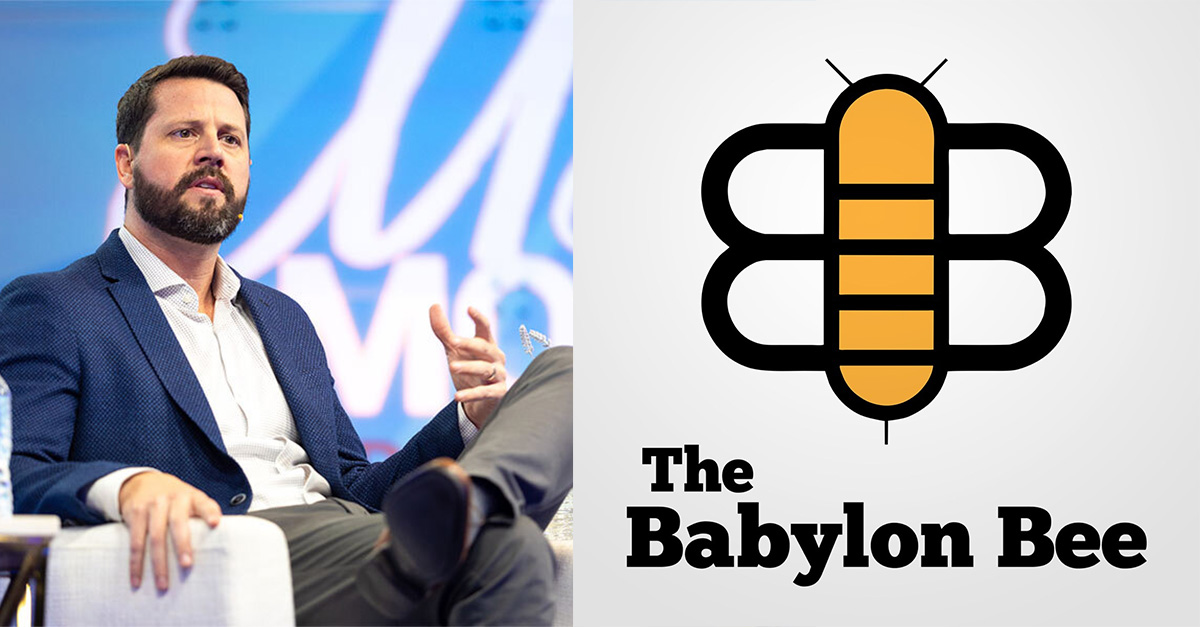


Get a free copy of Parental Rights & Education when you subscribe to our newsletter!

In celebrating this win for the First Amendment, Seth Dillon, CEO of “the world’s best satire site,” noted that the Golden State “keeps trying (and failing) to make comedy illegal.”
[UPDATE] California has agreed not to enforce its online censorship law against Christian satire site The Babylon Bee and political blogger Kelly Chang Rickert following a court decision that called the law “plainly unconstitutional.”
The announcement comes just three weeks after the Babylon Bee and Rickert sued the state over AB 2839 and 2655, two new laws that police political speech and parody.
Earlier today, the state of California and the Babylon Bee and Rickert agreed to consolidate Babylon Bee v. Bonta with Kohls v. Bonta, a separate case that challenged the constitutionality of AB 2839. In that case, Judge John Mendez blocked the law, which would have banned any speech that the state deems as false and harmful to a candidate’s electoral prospects or that it claims undermines confidence in the electoral process.
As part of the consolidation, California has agreed not to enforce that law against the Babylon Bee or Rickert.
Following the agreement, Babylon Bee CEO Seth Dillon wrote on X, “They keep trying (and failing) to make comedy illegal.”
The Babylon Bee and Rickert were represented by Alliance Defending Freedom (ADF).
Jonathan Scruggs, ADF’s vice president of litigation strategy and its Center for Conscience Initiatives, stated, “California’s war against political memes is censorship, plain and simple. We shouldn’t trust the government to decide what is true in our online political debates.”
He added,
“Gov. Newsom has no constitutional authority to act as the humor police. While lawmakers act as if posting and resharing memes is a threat to democracy, these laws censor speech California politicians don’t like. We are grateful that California’s unconstitutional law can no longer be applied to censor The Babylon Bee and Ms. Rickert while the case continues and that they are again free to exercise their First Amendment rights to poke fun at political leaders.”
Dillon will be one of six featured speakers at Freedom Uncensored 2024 this coming Friday night. The event, put on by the Standing for Freedom Center at Liberty University, is open to the public.
{Published on October 2, 2024} The Babylon Bee, the popular Christian satire site, has filed a lawsuit challenging two new California laws that restrict the ability to mock or criticize political candidates and elections.
In explaining the legal action, Babylon Bee CEO Seth Dillon stated, “Our job is hard enough when our jokes keep coming true, as if they were prophecies. But it becomes significantly more difficult when self-serving politicians abuse their power to try and control public discourse and clamp down on comedy. Unfortunately for them, the First Amendment secures our right to tell jokes they don’t like.”
The lawsuit is the culmination of a series of events that started this summer. In July, a political commentator created a satirical video of a campaign ad for a national candidate that was clearly marked as parody but used artificial intelligence (AI) to make it look like the candidate was saying things that hadn’t been said in real life.
The video garnered widespread attention online, including being reposted by X owner Elon Musk, whose post gained over 100 million views.
Despite the clear statement that the video was a parody, California Gov. Gavin Newsom, D, posted that the video “should be illegal” and promised to “sign a bill in a matter of weeks to make sure it is.”
Following Newsom’s promise, the California General Assembly expedited the passage of two bills, AB 2655 and AB 2839, which were promptly signed into law in mid-September by Newsom.
The laws, which took place immediately, bar “materially deceptive content” about political candidates that is “reasonably likely to harm the reputation or electoral prospects of a candidate.”
The laws also make it a crime to spread supposedly false information that casts doubt on the integrity of the election process or election results.
There is an exemption for satire; however, it requires the satirist to post such a noticeable disclaimer over the image that the plaintiffs claim it defeats the purpose — and effect — of satire.
AB 2839 initially featured a more substantive exemption for satire, stating, “This section does not apply to materially deceptive content that constitutes satire or parody” but following the parody ad and Newsom’s promise, it was removed.
The laws also provide exemptions for newspapers and certain broadcasting stations if the organization includes a disclaimer, even if the station includes the false information in the “bona fide” news.
The Babylon Bee and fellow plaintiff Kelly Chang Rickert, a lawyer who runs a political blog, claim that the laws unconstitutionally burden the right to free speech, especially considering that the laws relate to speech about the political process, which requires judges to exercise strict scrutiny in determining a law’s constitutionality.
The suit notes that even the California General Assembly admitted that the law burdened free speech and would draw legal challenges.
The plaintiffs also argue that the broad language used in the laws give government a license to outlaw most criticism of political officials and candidates.
“These subjective terms are codewords that allow government officials and political opponents to sue over content they dislike,” the plaintiffs claim. “These broad and vague laws will chill speech and debate that criticizes politicians and their platforms.”
They continued,
“Such censorship threatens the heart of public discourse. When debating controversial political ideas, candidates, and views, it is often hard to separate fact from opinion, truth from lies, exaggerations from malicious deceptions, humor from ill will. That’s why the First Amendment gives breathing room for political ideas to air and ventilate—even ideas that are wrong or deceptive. The First Amendment protects this freedom because it trusts the American people to be able to think and decide for themselves in the context of debating political candidates and issues. California officials don’t share that trust. They want to be the arbiters of political truth online.”
Rickert added in a separate statement, “My personal blog and social media accounts don’t need Newsom’s stamp of approval. This attempt to silence humor and other content that appeals to me and my audience is a blatant use of power to silence dissent.”
The Babylon Bee has said it will continue to post content that would likely be in violation of the laws without adhering to the requirement to parrot the state’s required disclaimer. This leaves them open to imminent prosecution and lawsuits due to the state enacting the law on an emergency basis.
Rickert wants to post content but is refraining due to fear of charges, meaning the law chills her speech.
The plaintiffs are represented by Alliance Defending Freedom (ADF). ADF Vice President of Litigation Strategy and Center for Conscience Initiatives Jonathan Scruggs stated,
“California’s war against political memes is censorship, plain and simple. We shouldn’t trust the government to decide what is true in our online political debates. Gov. Newsom has no constitutional authority to act as the humor police. While lawmakers act as if posting and resharing memes is a threat to democracy, these laws at the end of the day censor speech California politicians don’t like. We are urging the court to affirm that the First Amendment protects The Babylon Bee’s and Ms. Rickert’s freedom to poke fun at political leaders.”

Let’s call this out for what it is: Newsom and members of the California General Assembly want to take away the right of Californians to criticize or mock government officials or political candidates.
Satire is so powerful because in it is a kernel (or sometimes a whole cob) of truth. Without that kernel, it will not resonate. Throughout history, authoritarians have hated satire because they cannot stand to be mocked or to have someone challenge them.
In China, when people started using images of Winnie the Pooh as a stand-in to mock or criticize President Xi Jinping to get around China’s censorship, China banned Winnie the Pooh.
California’s leaders are looking very similar to China’s leadership with their draconian law.
The First Amendment exists to protect the right of Americans to say what they want but especially to criticize and call out government leaders and politics. That is how the people exercise power and keep a check on government.
These laws give California government officials the power to determine what can and can’t be said and who can and can’t say it. Notice the exemptions granted for certain government-friendly newspapers and broadcast organizations.
There is no way these laws remain on the books as federal courts will certainly slap them down. The question is how long will it take for a court to do so? Until then, and leading up to the November elections, California is putting its thumb on the scales, attempting to keep citizens from criticizing political candidates.
If you like this article and other content that helps you apply a biblical worldview to today’s politics and culture, consider making a donation here.
